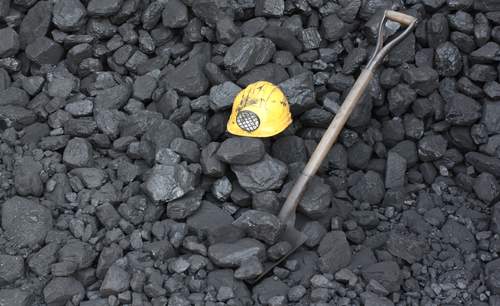Over the years, I’ve received questions about a picture that hangs over my desk.It’s a picture of my grandfather. He’s watched me work for many years now.
I never met him. Anthony DeLucca died almost 20 years before I was born, killed in a mining accident.For decades, that was all we knew. But as I grew older, I wanted to learn more about that day.From the Pennsylvania state mining records, I was able to find the abandoned entrance to the mine outside Hazelton — about a half hour south of Scranton. Suspending my common sense, I made my way inside to understand more of what he experienced.Miners often lived near their work. I walked around, asking older people I saw if they remembered the mine. That led me to old miners who’d been with him that day. They explained what happened.It was a normal workday. He’d been shoveling coal into a cart and was moving the cart when a cave-in began. This was the 1940s and cave-ins were still fairly common. He rushed to safety along with all the other workers in the mine.Because he’d been moving a cart, he left his shovel behind. As was typical after a cave-in, the rumbling stopped. That didn’t mean it was safe. There was a risk of a second cave-in. It would be a day or so before the miners could get back to work.Anthony was worried the next cave-in would shut down the section he’d been working in. The first one had been pretty close.He decided to go back for that shovel.This might seem foolhardy. But shovels were expensive. He was already losing money because of the cave-in, since miners weren’t paid for time they weren’t in the mine.One of his daughters was celebrating her First Communion that weekend. They’d just bought her white shoes the day before.There would be a party after the service on Sunday and that was an added expense. He just didn’t have the money to replace the shovel.Without a shovel, he couldn’t get back inside the mine. He’d have to take a lower-paying job until he could save enough to replace his shovel and his family would struggle even more in that position.So, he went in. And he died less than 100 yards from the entrance, shovel in hand.From our modern perspective, this tragedy seems avoidable. In his day, in his small town, anyone would have the done same thing he did.There’s a lesson for traders in his life.First of all, work is hard, but the benefits of hard work are rewarding. Successful traders don’t face the hardship of working in a mine, but they need to maintain the same dedication to their task that miners did in those dangerous environments.Safety is paramount. The mine workers had a plan. As the mine bosses told his survivors, my grandfather violated the safety guidelines and the plan. They did all they could and that cave-in plan was successfully executed.But there was something different that day. Anthony didn’t have his shovel with him as he evacuated. Different can be dangerous, and it was in this case.For traders, that same idea applies — different is dangerous. When we see something different in the price action, we need to think before rushing in. It’s our job to identify the danger, mitigate the risk, and then take action.My grandfather did that. Talking with miners who worked next to my grandfather, I learned he thought the risk was minimal. This wasn’t the first cave-in they experienced. It was common for miners to go in when things calmed down.Usually, they made it out the second time. Occasionally, they didn’t.In those days, many of the men felt they had no choice. Working conditions were terrible, pay was low, and families were expensive. They sacrificed many things for their families, and occasionally those decisions ended in tragedy.Traders don’t risk their lives to earn a living. But they should treat risks as if their lives depended on success.When we see problems in the markets, analyze the situation to ensure there are no hidden risks. Always assume there’s a risk you can’t see and be prepared for that one.I’ve learned, it’s often best to accept the loss of a shovel to avoid additional risks. And I’m thankful I’m in a position where I can accept that loss.Regards,
